We may be The RVgeeks today, but 18 years ago we were RV newbies, and we needed all the tips we could get… and then some! But after spending close to two decades traveling, living, and working in an RV, you can bet we’ve learned a lot and amassed lots of great tips. And we love sharing them with folks who are just getting started in their own RV adventures. Or those who, like us, continue learning more about RVing every year.
Today we’re sharing with 10 pro tips for RV newbies – because we were all RV newbies once. And making RV life a little easier and more enjoyable for those who are just getting started is how RVers like to roll. So, let’s get rolling…
-
1)
10 Pro Tips for RV Newbies
- 1.1) 1. Use Checklists… For Everything!
- 1.2) 2. Plan RV-Safe Driving Routes – Don’t Trust Regular Map Apps
- 1.3) 3. Know Before You Go
- 1.4) 4. Use the Internet to Your Advantage
- 1.5) 5. Utilize RV Club Memberships
- 1.6) 6. Learn How to Find Great Campsites, RV Newbies & Experts Alike
- 1.7) 7. Try Different Types of Camping
- 1.8) 8. Take it Slow
- 1.9) 9. Follow the 2/2/2 or 3/3/3 Rule
- 1.10) 10. Keep a Tool Kit Handy
- 2) Conclusion
10 Pro Tips for RV Newbies
These tips aren’t in any particular order – we think that they’re all equally important. But what they all have in common is the fact that following them will help any RV newbie move in the direction of becoming an RV pro in no time flat.
1. Use Checklists… For Everything!
Checklists are important – and not just for us old guys! There’s a lot to remember when you’re setting out on any trip, but when you’re packing your home-on-wheels, planning your driving route to a variety of destinations, and making plans to arrive here or there at this time or that, you’ve got a whole lot to organize. Use checklists.
Make separate lists for packing the rig – tools, clothing, medications, food, technology, recreational items, etc. Separate lists are easier to conquer, one bite at a time, so they don’t feel overwhelming.
Making a list of the sights you want to see, events you want to take in, national parks, state parks, etc., will help you in your trip planning process (more on that later).
Some people prefer to use good old-fashioned pen and paper to make their checklists, crossing them out as they move along (it IS very gratifying). That’s great! If you don’t have the time (or inclination) to create your own, check out these printable checklists from our friends Rae & Jason (GetawayCouple).

Some folks prefer to sit down with pen and paper and make their checklists, while others prefer to use a smartphone or tablet app. Either way, checklists will make your RV life easier! (Note: creating your lists in a reusable form is something you’ll quickly come to appreciate.)
Or if you prefer a more digital approach, there are apps available for note-taking (try your phone’s built-in “notes” app or use something like Evernote) as well as dedicated RV checklist apps (like the Ultimate RV Checklist: available for iOS/Apple and Android/Google).
Either way – making checklists for everything will make life easier for you in the end, whether you’re an RV newbie or a seasoned pro. Checklists help you remember things and organize the various facets of traveling and living in an RV.
Speaking of the RV, don’t forget to make a checklist for all the things you need to do prior to safe departure in your RV (did you close that vent cover and bring in your slides and steps?), and a checklist for all the things you need to do upon your arrival at your campsite or other overnight spots (and when you leave, you’ll appreciate having the departure checklist to refer to again).
There’s a lot to remember when you’re driving your home. Of course, we’ve been doing this full-time for nearly 20 years, so we’re not exactly RV newbies, but we highly recommend checklists.
2. Plan RV-Safe Driving Routes – Don’t Trust Regular Map Apps
Even RV newbies are well aware that driving an RV is different from driving a car, truck, or SUV. When you’re traveling in an RV, there are many things to think about that aren’t considerations when traveling in a smaller, less complicated vehicle.
Some examples are the height and width of your rig, whether you’re carrying propane, and whether you need (or want) to avoid long steep grades. Planning an RV-safe driving route is different than driving in your car, so we strongly suggest that RVers don’t rely solely on regular GPS units or mapping/routing apps to plan their RV travels. Fortunately, there are many devices & apps that have been created with RVers in mind, and these are very helpful – not only to RV newbies but to all of us.
For that purpose, we have an RV-specific GPS unit from Garmin:
- Large 8" RV navigator with high-resolution touch display and options for portrait and landscape mode.Control Method:Touch,Application,Voice.Special...
- Custom routing considers the size and weight of your RV then finds the best route (not available in all areas)
But, while we really like our Garmin RV890, it’s not our sole means of navigation. An RV-safe GPS device is fantastic since it helps to account for your rig’s height, weight, length, and propane when route planning. But, every navigation system has its weaknesses, so we don’t rely solely on any single means of navigation. We like to double-check our routing using other RV-safe GPS apps (like the ones that come with upgraded membership/subscription to services like RV Life Pro and ToGo RV Plus) and compare them to the route suggested by Apple Maps or Google Maps to see how they differ and to be sure we know why.
We’ve also used a variety of RV trip planning apps and have developed some favorites over time… watch the following video to learn more:
Our favorite trip planners include apps/services like The Dyrt PRO (sign up for the free 30-day trial of PRO to get access to the trip planning feature), RV Trip Wizard (part of the RV Life suite of tools/services that include an RV-safe GPS app), and Roadtrippers (part of ToGo RV Plus, which also has an RV-safe GPS app).
Above all, remember that RV-safe routes are very important – not only to your convenience but to your safety and that of your family and your RV. Despite all the available technology, there’s one resource we employ as a failsafe over all others — our vision and attentiveness to our surroundings.
If there’s a sign warning us of a low overpass ahead, we see and respond accordingly, regardless of what ANY app or GPS system says! But that system only works if you’re an attentive driver. Don’t outsource your safety!
3. Know Before You Go
This is more important than you might think. Knowing what to expect ahead of your arrival at any location is imperative when you’re traveling in an RV. This is true not only for RV newbies, but for all of us.
If you’re working as you travel or need to be able to connect to a cell signal to maintain contact with family, friends, or employers, knowing where you can expect a good connection (or no connection at all) is very important. Most of all, this can also be a matter of safety. No matter how you slice it, getting to a campsite and finding out only upon your arrival that you can’t connect to anyone anywhere can be a sobering experience.
Likewise, arriving to find that the safety or cleanliness of the campground is outside your comfort zone is a rude awakening, especially when you arrive late in the day and have no choice but to stay there for the night.
So, how do you know before you go? Apps and websites like The Dyrt and Campendium offer reviews from travelers just like you who have been to the places you’re considering. They’ve had real-life experience with these places, and they’ll tell you what you can expect before you get there, often including reports on cell signal strength for the major carriers. There’s nothing better for RV newbies than the experience of long-time campers.
Additionally, you can use Google Maps (we use both satellite view and street view) to scope out the entrances to various places to make sure you’re able to get in and out of those spots with relative ease.
Scoping out in advance the places you intend to visit and the campsites, parking lots, etc., where you’re considering staying overnight is a wise expenditure of your trip planning time.
4. Use the Internet to Your Advantage
The Internet is a veritable wealth of information, and using it to our advantage as RVers is not only wise but at times essential.
We’re all familiar with browser searches. For example, if you need to replace your RV’s fresh water pump and you want to know if we’ve published a post or YouTube video showing you how to do that, you could conduct a Google search using terms like “RVgeeks water pump.” More broadly, you might search “How to replace an RV water pump.”
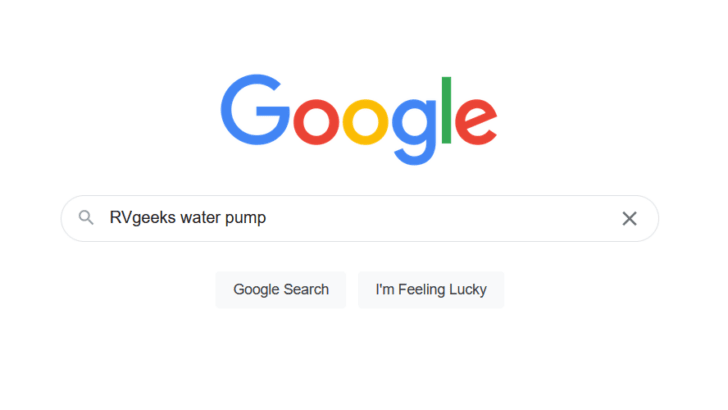
Simple searches are great, but there are many other ways to learn about RVing, such as through user forums and groups where experienced RVers are willing to share information.
But there are options available to you in addition to Google or YouTube searches. There are a number of RV forums and Facebook groups you can join that are related to your specific interest.
For example, you might join an online forum or Facebook group related to your specific RV brand or model. For us, that would mean joining a group related to the Newmar Mountain Aire, or more broadly, to Newmar motorhomes.
These types of groups are fantastic as there are often members with a ton of knowledge and experience to share. New RVers often join groups like these when they’re starting out and soon become voices of experience for other newbies who join the group.
Additionally, if you’re experiencing a common problem, it’s very likely that someone in an online group has already had that issue and can tell you how they resolved it, what was involved, how much it cost, and more.
Search forums such as those found at iRV2.com (free to join & post) and Facebook, or do a Google search for your specific interest, for example, “Newmar RV groups online.”
5. Utilize RV Club Memberships
There are a wide variety of RV membership clubs, some better than others, all having the goal of assisting RVers in one way or another. These clubs can offer members a community, education, discounts, and much more – all of which are generally very beneficial to RV newbies (and us oldies, too).
For example, the Escapees RV Club is one of the oldest, largest, and most popular RV membership organizations in the world. We’ve really enjoyed being a part of the Xscapers group, which is a group-within-a-group of the Escapees RV Club. It was created specifically for adventurous and working-aged RVers, like us!
Extra Note! The Escapees RV Club now also offers a new tire savings program to its members. For folks who spend a fair amount of time on the road, this alone could be worth the price of membership. And this is only one of many benefits that make joining Escapees worthwhile.
If you use this link to become a new Escapees RV Club member, we’ll donate 100% of our affiliate proceeds to the Escapees C.A.R.E. Center. It’s a 501(c)3 nonprofit that provides a safe haven for members whose travels have permanently ended due to age, or whose travels have been temporarily interrupted due to health problems.
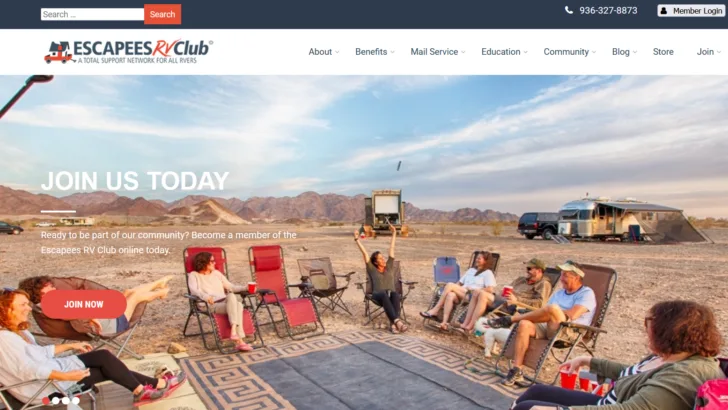
A membership to a club like Escapees offers new RVers community, education, discounts, and more.
We also have coupons and/or discounts for memberships to the following clubs – for RV newbies and those more experienced alike. Use the embedded links and/or coupon codes:
- Harvest Hosts – Use our link to save 15% on a Harvest Hosts membership that allows you to stay overnight at US and Canadian farms, wineries, breweries, golf courses, and more… all year for one very low annual membership fee. For the price of one or two nightly campground fees, you can have an entire year’s Harvest Host membership and enjoy incredible and unique experiences.
- Boondockers Welcome – use the coupon code RVGEEKS15 and get 15% off of a one-year Boondockers Welcome membership that allows you to stay overnight with fellow RVers who welcome you to stay on their private property.
- Passport America – join and save up to 50% on nightly campground fees (can be limited to specific times) at a huge list of RV parks and campgrounds throughout North America.
- The Dyrt PRO – part of the upgraded offering from The Dyrt provides you with access to discounts of as much as 40% off your first night’s stay at thousands of campgrounds across the US.
6. Learn How to Find Great Campsites, RV Newbies & Experts Alike
Knowing how to find great campsites is important, and we covered this briefly above in the section, Know Before You Go. It’s worth repeating because where you set up camp to spend your time definitely contributes to your entire RVing experience.
Again, we’d encourage you to use apps and websites like The Dyrt, Campendium, and others that will help you to find great campsites to make your camping experiences both comfortable and enjoyable. We’ve covered this already in a previous post, so you can learn How to Save Money on Campgrounds.
7. Try Different Types of Camping
This is one of our most important pieces of advice for RV newbies and for everyone: try different types of camping.
There is such a fantastic variety of places available to campers of all types. There are commercial RV parks and campgrounds, state parks, national parks, and our personal favorite, boondocking.
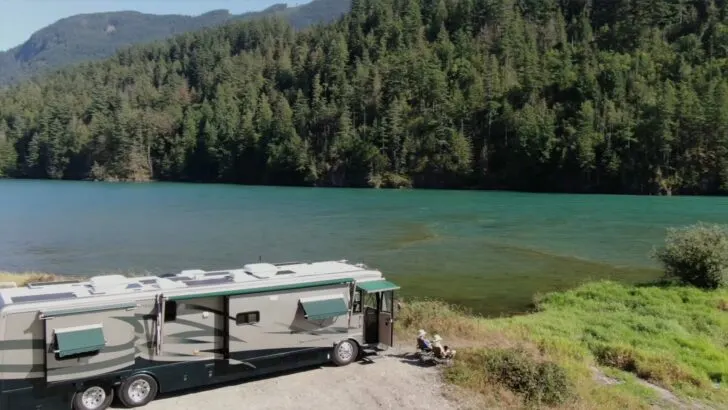
Boondocking is our favorite way to camp. Sometimes new RVers are afraid to try boondocking for fear of being off the grid for power, water, and sewer. But RVs are made to sustain us through a period of boondocking, and we encourage all RVers to try it.
Boondocking includes the forest, the desert, camping at farms and wineries (Harvest Hosts), camping on the private property of fellow RVers (Boondockers Welcome), BLM (Bureau of Land Management) land, Army Corps of Engineers land, and even overnight stays in parking lots that offer a good night’s rest in the middle of a long road trip.
We enjoy all types of camping and have participated in all of the above, and we encourage you to do the same.
But if there’s one thing we know and love, it’s boondocking. So, here’s our Complete Guide to Class A RV Boondocking for those interested, and here’s our post on The 11 Best Ways to Find RV Boondocking Spots.
Also, be sure to check out your state parks and favorite RV parks and campgrounds in your area. And if you’re lucky enough to be near, or planning a trip to, a National Park, you can buy an annual America the Beautiful National Parks and Federal Recreational Lands Pass to make entry to the parks more affordable (and if you’re a senior or military (active/veteran), you can save even more on National Park passes).
8. Take it Slow
Hear us out: hurrying from one location to another is not generally the best way to travel. We know there are so many amazing places to go and things to see in this world, and we’re all for getting out there and doing it. We’ve been doing it ourselves for nearly 20 years now, so we get it.
But honestly – part of the journey is enjoying the trip. Drive slowly, give yourself plenty of time to travel to any location, and plenty of time to enjoy a location once you’re there.
When you’re camping, give yourself plenty of time to set up camp, and plenty of days to really enjoy a beautiful campsite when you find one.
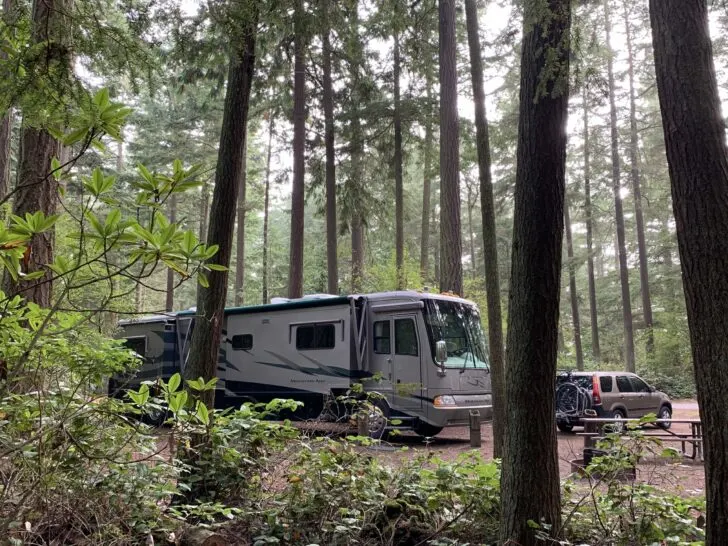
Take your time setting up camp and getting to know the area where you’ll be camping.
There’s no hurry – that’s one of the most wonderful things about this lifestyle. Because we’re still working, we do have to hurry at times – and we do have deadlines to meet. So, we understand that sometimes it’s necessary to set a schedule and stick to it.
But when you don’t have a demand to meet or a schedule to adhere to, take it slow. Really. Enjoy the ride. Look out the window and take it all in. See a beautiful park, an inviting fishing spot, or an intriguing shop? Stop and enjoy it. Relax. Slow down. Carpe Diem.
9. Follow the 2/2/2 or 3/3/3 Rule
This one goes along with the “take it slow” tip. There are a couple of rules that experienced RVers mention to RV newbies frequently, and most adhere to one or the other.
The 2/2/2 rule refers to a policy of driving no more than 200 miles a day, stopping every 2 hours, and staying overnight for 2 nights in each place. A fourth “2” suggests arriving at your daily destination by 2:00 PM so that you have plenty of time to set up camp in daylight and get to know the amenities of the campground and the surrounding area while relaxing after a day of driving.
The 3/3/3 rule is similar, though as you might expect, it refers to traveling no more than 300 miles a day, stopping every 3 hours, spending 3 nights in each place, and arriving at your destination by 3:00 PM.
Many RVers use variations of these personal “rules,” for example, the “330 rule”. Drive no more than 330 miles a day and stop driving for the day by 3:30 PM.
Any way you want to distribute your energy, following some sort of “take it slow and easy” rule is a good idea.
10. Keep a Tool Kit Handy
As serious DIYers, you can imagine that our tool kit is pretty important to us. Not everyone likes to do as much of their own maintenance and repair work as we do, but everyone should carry at least some basic tools.
These might include a small, basic tool kit – wrenches, screwdrivers, pliers, channel locks, a socket wrench & sockets – plus items such as Dicor sealant and caulking gun, Eternabond tape, extra fuses, cable/zip ties, a spare sewer hose, miscellaneous screws, nuts, and bolts, plus an inexpensive multimeter, a crimping tool, wire connectors, a roll of electrical tape, a roll of plumber’s tape, and a box of nitrile gloves.
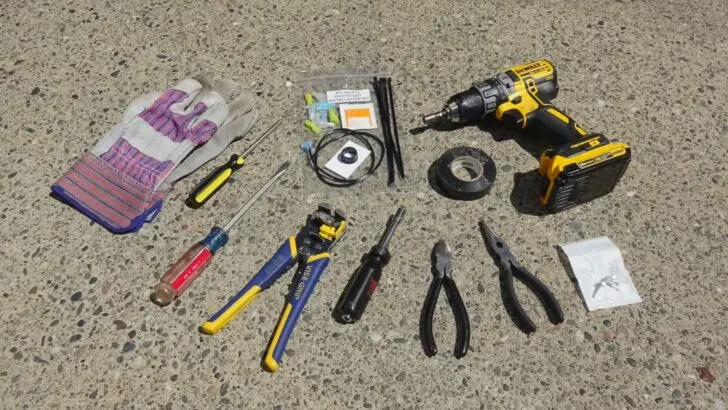
It’s important to carry some basic tools in your RV for any necessary repairs that may come about when you’re traveling.
It’s quite possible that all of these items might not be necessary for you (for example, maybe you’ll never tackle even a minor electrical issue), but a basic tool kit is a must-have for all travelers because even if you’re unable to take on a repair yourself, there are always kind-hearted fellow campers around who will surely be willing to lend a capable hand if you’ve got the tools handy.
Conclusion
We hope you’ve found this list of tips for RV newbies helpful. Remember that every RVer was a newcomer at one time, and most are happy to help when an RV newbie finds himself or herself in a pickle.
Not long in the future, you’ll be the helper, and the RV newbie will be learning these tips from you!
Geek Out with Us Every Week
Join our newsletter to learn about all things RV-related. Every week we offer free tips, tricks, product reviews, and more to our online community of RVers. So, whether this is your first time on the road or you’re a seasoned expert, we’d love for you to geek out with us!



David
Sunday 19th of September 2021
This is a great help to us! We are getting ready to arrive back in the USA, move into a 34 foot motorhome which will be our home for the next year at least as we travel all over the country. We have just about a month before we arrive and will give your Top 10 careful consideration. Thanks again!
TheRVgeeks
Sunday 19th of September 2021
That's awesome, David! great to hear. Safe travels!